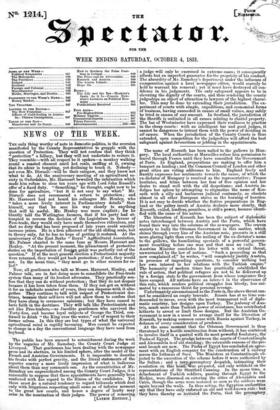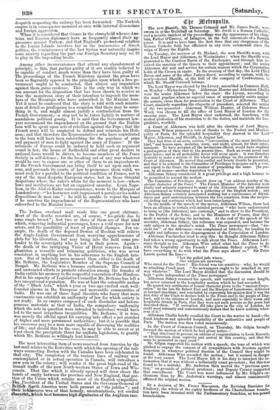The liberation of Kossuth has been the subject of diplodiatic
notes interchanged between Austria and the Porte, which have found their way into the columns of the newspapers. The craven anxiety to bully the Ottoman Government in this matter, which shines through every line of the Austrian note, presents in a still more glaring light than even the nailing of the ex-dictator's name to the gallows, the humiliating spectacle of a powerful -govern- ment trembling before one man and that man an exile. The Austrian Minister concludes his letter with a virtual threat, unwarranted by the law of nations. " Such a proceeding as that now complained of," he writes, " will completely "notify Austria, in presence of impending questions, to consider nothing but her own interest in her relations with the Turkish empire." The humanity of modern times has practically established the rule of action, that political refugees are not to be delivered up by a foreign state to the government from whose vengeanee they have escaped. All nations have an intere-,t in the observance of this rale, which renders political struggles less bloody, less ani- mated by a rancorous thirst for personal revenge. Unfortunately circumstanced as the Porte is, the above threat can- not be considered an empty bravado. Russia has at no time con- descended to cover, even with the most transparent veil of diplo- matic courtesy, her designs upon Turkey. The jealousy of Aus- tria, much more than Turkish power of resistance, has contributed hitherto to arrest or limit those designs. But the Austrian Go- vernment is now in a mood to avenge itself for the liberation of Kossuth, by making common cause with Russia against Turkey, in defiance of every consideration of prudence. At the same moment that the Ottoman Government is thus threatened by a hostile combination from without, it has contrived, to involve itself in a quarrel with its most powerful feudatory, the' Pasha of Egypt. The grudge between the courts of Constantinople and Alexandria is of old standing ; the ostensible reasons of the pre- sent breach are new. The Pasha of Egypt has conolu.ded an ee- meat with an English company for the construction of a railway across the Isthmus of Suez. The Ministers at Constantinople ob- jected to the execution of the scheme before it were authOnzed by the Sultan ; and 'a veryaieremptory despatch, intimating their resolution on this head; %.s prepared, and only withheld on the representations of Sir Stratford Canning. In the mean time, a detachment of Turkish soldiers, passing through Egypt to the Hedjaz, were disarmed on entering the cities of Alexandria and Cairo, though the arms were restored as soon as the soldiers were again beyond the walls. In thus acting, the Egyptian authorities say that they have only enforced an old and well-known rule : but they have thereby so irritated the Porte, that the peremptory
despatch respecting the railway has been forwarded. The Turkish empire is in consequence menaced at once with internal dissensions and foreign aggression.
When it is considered that Greece is the stronghold whence Aus- trian and Russian diplomacy have so frequently aimed their ag- gressions against Turkey, and that England's protectoral relation to the Ionian Islands involves her in the tracasseries of Greek politics, the reminiscences of the last Syrian war naturally inspire some anxiety regarding the part our Foreign Secretary may see fit to play in the impending broils.



























